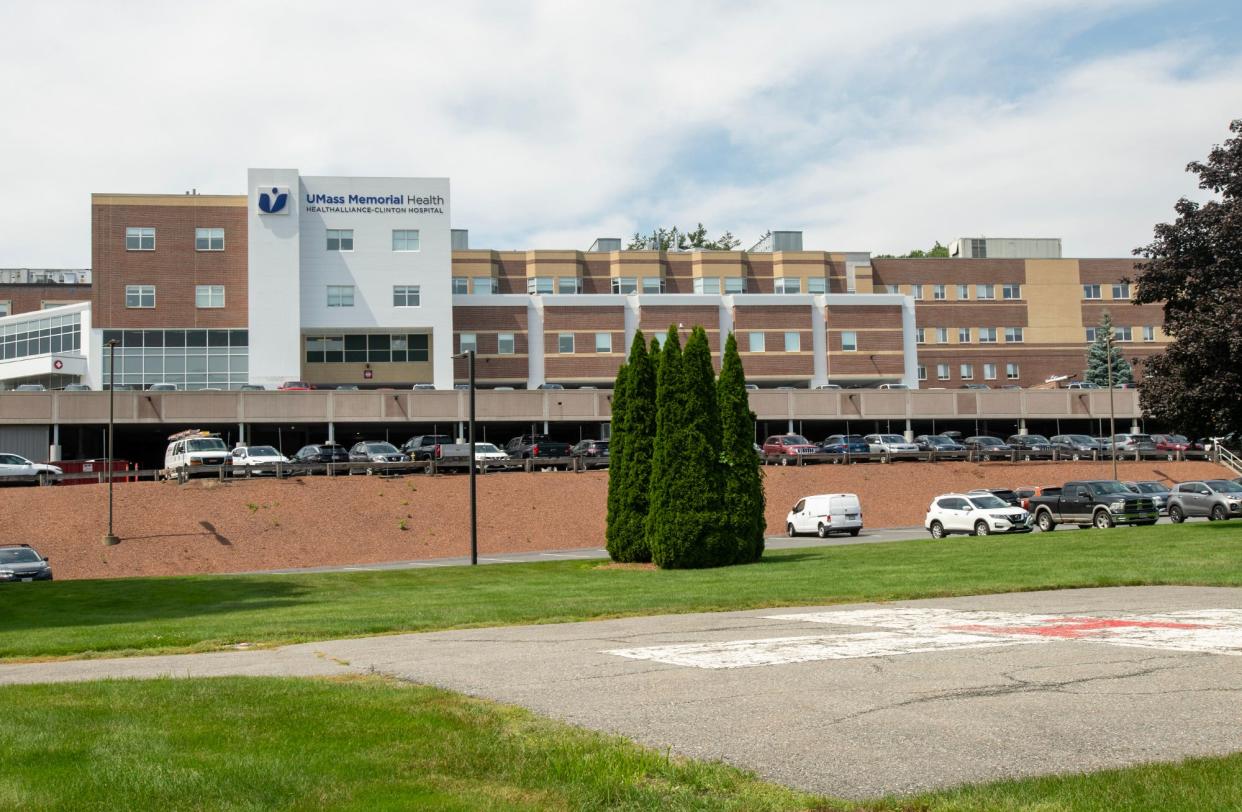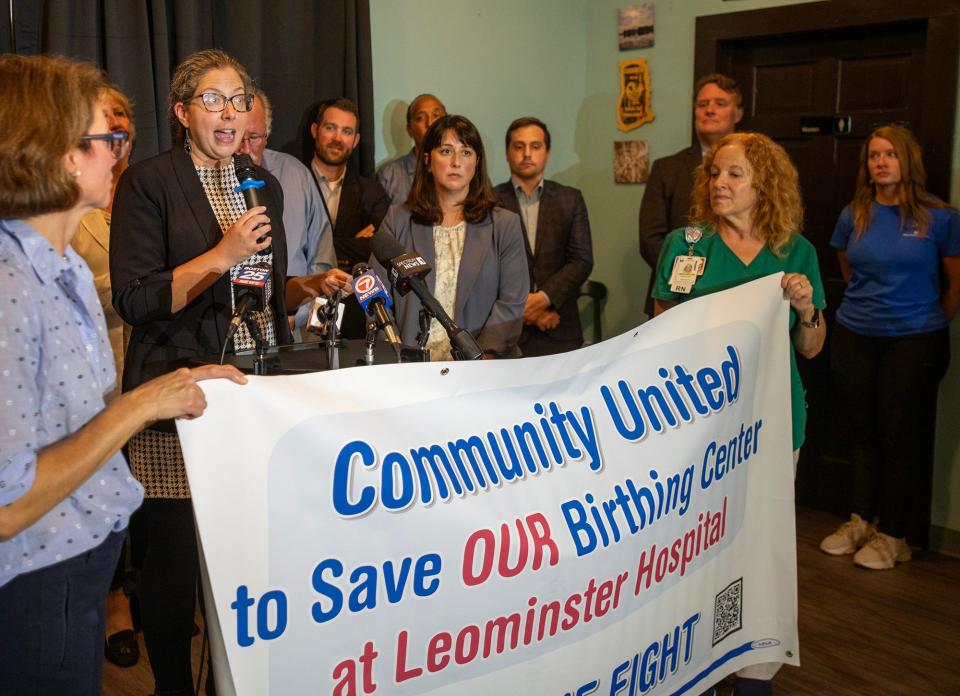'Multiple challenges' for state in improving maternity care, report says

WORCESTER – Nearly two months after UMass Memorial Health shut down its maternity unit in Leominster, a state report said Massachusetts faces “multiple challenges” to improve the health of pregnant mothers.
They include “alarming” disparities in care for people of color, a shortage of health care workers and numerous closures of maternity units, especially in rural areas.
Gov. Maura Healey ordered the report when the Leominster unit closed Sept. 23. State health officials Wednesday released a second report on access to essential health services in North Worcester County, also ordered by Healey.
“While there are no maternity service deserts in the state, as defined by March of Dimes, compared to other states, MA has fallen behind in the number of birth centers available,” the statewide maternity report reads, using the postal abbreviation for Massachusetts.
Closures are problematic because many patients may have a hard time getting prenatal care appointments, according to the study. In addition, birth centers reduce the number of medical interventions during labor and delivery, improve patient experience and lower costs, the report stated.
'Too little, too late'
State Rep. Natalie Higgins, D-Leominster, expressed her disappointment in the report on maternity services.
"Too little, too late," Higgins said. She believes the Department of Public Health should have included language recommending that it have the legal authority to stop a hospital from closing an essential service.

Currently, the department lacks that authority.
“I was hoping in both reports that the DPH would come out with a strong commitment to change the essential services process,” said Higgins.
The state heath department deemed the Leominster unit an essential service to the communities the hospital serves. The department also ruled that the hospital’s closure plan was not adequate to ensure proper access to maternity services after the unit closed. It asked UMass to postpone closure until it presented a complete plan.
UMass still moved ahead with closure, citing falling birth rates and a staff shortage as the primary reasons.
Some lawmakers, nurses and community members claimed the shutdown was purely about finances, pointing out payments from government-funded insurance plans didn’t cover the cost of care. As a result, UMass Memorial funneled labor and delivery patients to its Worcester campus in order to manage costs, those parties said.
A pending bill calls for the state health department to have the power to force a hospital to keep a service open if it deems the service essential. The hospital could reapply for closure in three years.
Higgins, the bill’s lead sponsor, said it sits in a rules committee where it needs permission to get a public hearing. If that happens, it could be part of a health care bill next year.
Meanwhile, Higgins said she and other lawmakers in North Central Worcester County had discussions with federally licensed community health centers in the region to open a birth center outside of a hospital. Leominster and Fitchburg were discussed as possible locations for the center.
However, it’s not possible because those locations are too far away from the nearest hospital with maternity services. That would be Heywood Hospital in Gardner and Higgins said in cases of birth complications, a hospital has to be nearby for backup safety reasons.
“How to do (a birth center outside of a hospital) safely is the big question. It will take more time,” said Higgins, adding that Gardner could be worth exploring as a future landing spot.
Recommendations in state reports
One recommendation said the state's Executive Office of Health and Human Services should continue to engage with UMass Memorial Health on ways to increase its presence in communities across the region.
UMass Memorial Health issued a statement Wednesday in response to the latest state reports that didn't mention the closed Leominster unit: “We appreciate the governor’s recent report outlining recommendations for increasing and preserving access to care across our region. Attention and creativity in areas including staffing, specialty care, clinician training, virtual medicine, and more will continue to be a critical focus for improving health outcomes for our valued patients and the communities we serve."
The statement mentioned UMass Memorial investments in specialized care in North Central Worcester County:
● Cancer care and state-of-the-art diagnosis and treatment technology for more than 20 years at HealthAlliance Clinton Hospital in Fitchburg
● Advanced mammography technology for early breast cancer detection
● A clinic at HealthAlliance Clinton Hospital in Leominster that brings in specialists from UMass Memorial Medical Center in Worcester. The plan is to expand clinic operations this year that currently serve more than 12,000 patients annually
In addition, UMass said it had invested more than $2 million to address health disparities and housing challenges. Another $1 million will fund programs to support broader health care needs including those of women and pregnant mothers.
Good first step and immediate moratorium
The Massachusetts Nurses Association called the reports a good first step by the Healey administration to tackle a “growing maternal child health crisis in Massachusetts."
The nurses association wants an immediate moratorium statewide on the closure of any inpatient maternal health service until a region-by-region assessment is completed of all issues related to maternity care. The assessment would also address the health of those communities including access to healthy food, clean water, health insurance and primary care. Plus, connections to mental health and substance abuse treatment and nutrition programs.
The nurses association filed legislation to create the assessment and it believes the state health department and the Healey administration can start the process now without legislative approval.
Challenges in North Central Massachusetts
Highlights in the report that focused on North Central Massachusetts included a lack of health services outside the larger population areas located along Route 2. The result is a need for investments in telehealth, home-based and mobile health care.
Other concerns include a shortage of primary care doctors, a dearth of mental health and substance use disorder services and few transportation options for residents to get to health appointments. Ambulances are used for nonemergency calls, leaving communities with skeleton crews to handle emergencies.
More recommendations
Both reports listed a string of recommendations to improve access to maternity and other health services including:
● Review the state’s essential service closure process and update laws and regulations to better protect patient safety
● Better pay in order to boost staff recruitment and retention. Others ways to attract and keep staff include upping the supply of affordable housing and child care options. City, town and state funding could subsidize housing costs for health care workers through tax breaks for landlords, rental subsidies for health care workers and tax deductions.
● The state’s new Housing Advisory Council could explore ways to give incentives to health care workers to move to rural and underserved areas
One creative idea cited is looking at unused spaces at community colleges and state universities to house health care workers.
As for the lack of child care options and its impact on the supply of health care workers who have children, the report on statewide essential services suggested locating child care in or near health care facilities. Free or discounted child care could be offered.
A higher minimum wage for health care workers is another option worth exploring, the report said.
Contact Henry Schwan at henry.schwan@telegram.com. Follow him on X: @henrytelegram.
This article originally appeared on Telegram & Gazette: Massachusetts hospitals need to improve maternity care, report says

